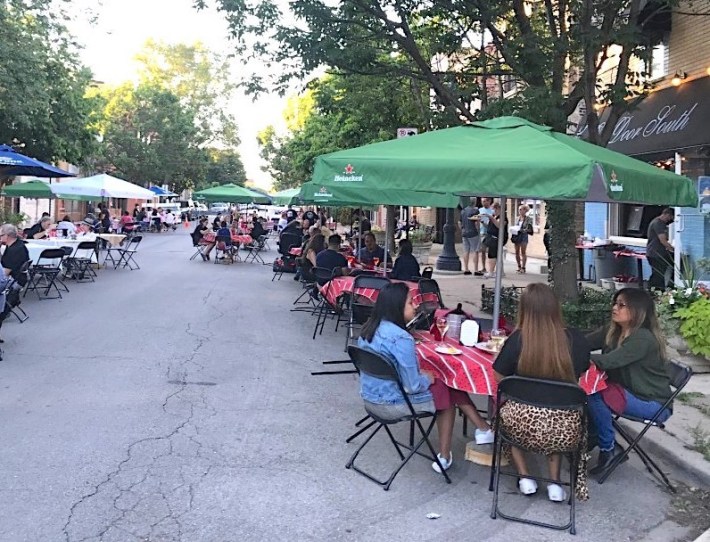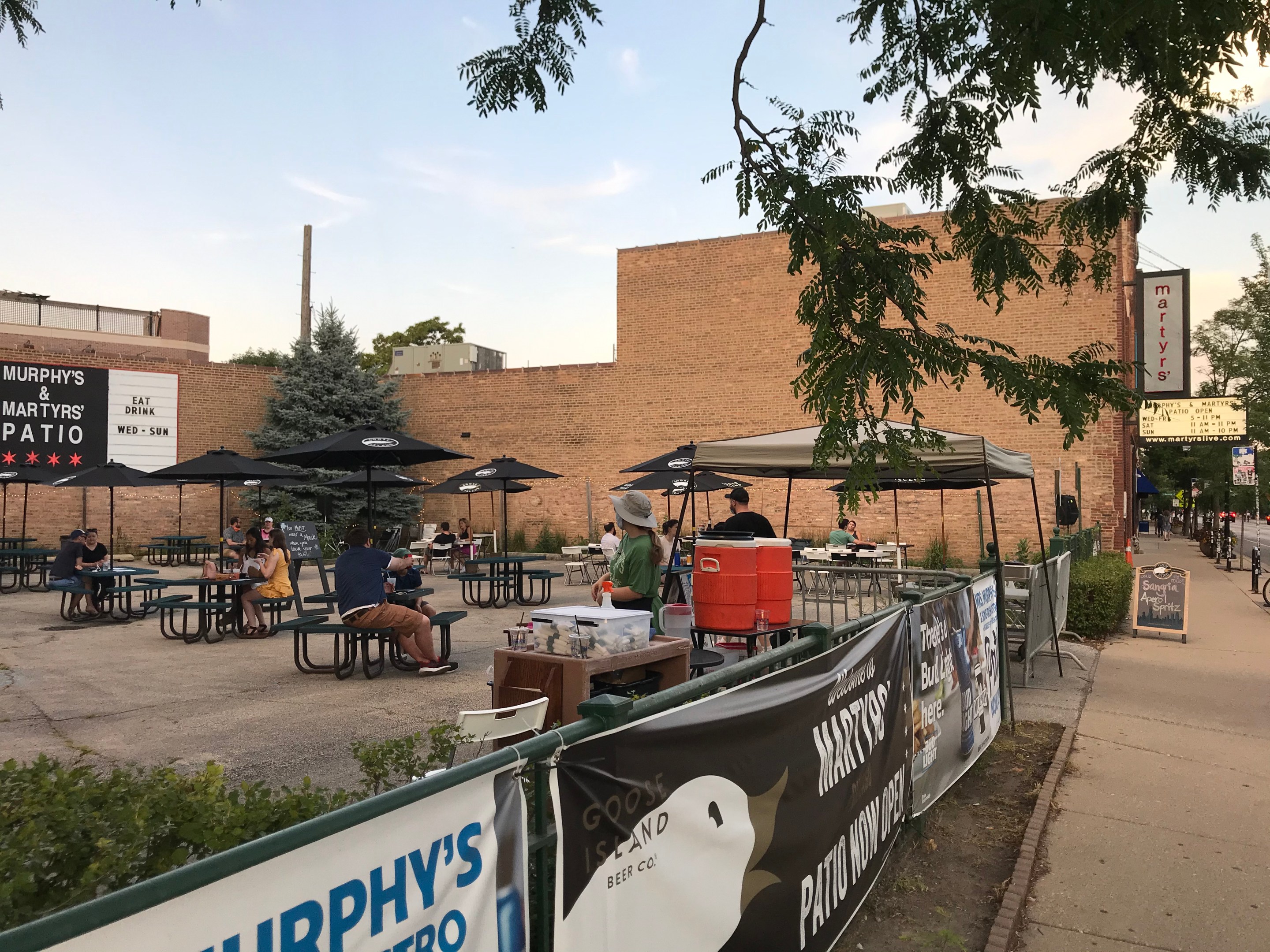Pandemic experts like Dr. Anthony Fauci have identified indoor service at bars as a major potential source of COVID-19 spread, due to the likelihood of people standing around talking with strangers, shouting to be heard above loud music and projecting respiratory droplets. And with COVID cases on the rise in Chicago in recent weeks, including a spike in infections among young people in the tavern-heavy neighborhoods of Lakeview and Lincoln Park, Mayor Lori Lightfoot moved last week to prohibit indoor service at drinking establishments that don't serve food, with the ban kicking in last Friday.
Arguably, Lightfoot's action didn't go far enough, since most of the Wrigleyville bars that have experienced dangerous indoor crowding during the pandemic have kitchens and therefore aren't affected by the rule. And Fauci has also stated that indoor restaurant dining should either be discontinued or approached with extreme caution due to the lack of fresh air circulation inside many eateries as well as watering holes.
So perhaps the mayor should have required that all bar and restaurant drinking and dining take place outdoors. However, it's undeniably sad that the indoor bar service ban was the last nail in the coffin for a number of beloved Chicago taverns that lack kitchens.
The city of Chicago has already facilitated outside service during the pandemic by making it easier and cheaper to get the go ahead for outdoor tables on sidewalks, patios, and parking lots, as well as allowing business so place seating in front of neighboring storefronts. And the city's Cafe Streets program, which temporarily pedestrianizes roadways to make more room for socially-distanced dining and drinking, seems to be a huge success from an economic standpoint, providing a shot in the arm for the struggling hospitality industry. I've advocated for all of these initiatives on social media and in Streetsblog posts.
Free advice for @chicagosmayor & @ChicagoBACP: To help restaurants and @chicagobars recover after SAH is lifted, when people will be wary of drinking and dining indoors, ease the rules and fees for sidewalk cafes, so more places can have them, and have larger cafes. (1/2)
— John Greenfield (@greenfieldjohn) May 1, 2020
Still, the tavern death march has continued. For example, the owner of the longtime Ukrainian Village side-street bar Innertown Pub said this week it was in danger of going out of business because 2nd Ward alderman Brian Hopkins and the Chicago Department of Business Affairs and Consumer Protection had been dragging their feet on approving a beer garden permit.
But there was some good news today for the industry, as well as for fans of taverns and vibrant street life. Lightfoot, BACP, and the Chicago Department of Transportation announced a further liberalization of the city's Expanded Outdoor Dining Permit , which they say has supported more than 250 restaurants and bars to date. Effective immediately, bars, taverns, and breweries that lack kitchens can apply to temporarily serve on the sidewalk in front of their storefronts, and all restaurants and bars may use the permit in outdoor areas that would typically require an outdoor patio license.
“While we’ve had to implement restrictions and take hard measures to combat a recent rise COVID-19 activity, we will continue to ensure our restaurants, bars and businesses have the supports they need to survive during these unprecedented times,” Lightfoot said in a statement. “By expanding our efforts to better support our bars impacted by these new restrictions, we are providing a lifeline to hundreds of local establishments across Chicago’s neighborhoods.”
Before today's policy change, individual businesses that serve alcohol but lacked kitchens weren't allowed to have sidewalk cafes. The sidewalk space used by bars and taverns under the new rules must allow for six feet of pedestrian clearance, and service areas must be enclosed by a barrier. In addition, booze purveyors must partner with a food establishment to give patrons the option of ordering a meal or snack, which would help slow down their absorption of alcohol. After all, as the old New Orleans saying goes, enjoying libations should be a marathon, not a sprint.
“In times like these, city government must be nimble and flexible and give businesses the opportunity to stay afloat,” said BACP chief Rosa Escareño.

For the expansion of outdoor service on private property, the Expanded Outdoor Dining Permit permit has only been available at locations that are temporary in nature, such as parking lots. For other locations where permanent operations would be possible, such as patios, courtyards, or terraces, applicants were required to obtain an outdoor patio license. Effective today, bars and restaurants can use the Expanded Outdoor Dining Permit to temporarily operate in locations that would typically require the permanent patio license, which the city says will reduce the time to receive approval by up to two months and removing additional regulatory hurdles that have prevented some applicants from receiving their permits. So it sounds like the new policy will be a big help for the Innertown Pub.
“Opening up opportunities for neighborhood gathering places to thrive is an excellent use of the city’s public way,” said CDOT chief Gia Biagi, discussing the Cafe Streets initiative. “The Expanded Dining Program is providing safe, popular and healthy alternatives for people wanting to explore our neighborhoods.”
According to the city, there are currently 840 active sidewalk cafe permits. In addition, 614 establishments have outdoor patio licenses, allowing them to permanently operate in outdoor private property or on rooftops. The 250 establishments using the Expanded Outdoor Dining Permit includes 108 establishments operating on private property and 145 participating in Cafe Streets roadway openings.
Here's the list of Cafe Streets this weekend, purple on the map above.
- Andersonville: W. Balmoral St. both sides of N. Clark St.
- Chatham: E. 75th Ave. from S. Calumet Ave. to S .Indiana Ave. (sidewalk only, not shown on map)
- Chinatown: S. Archer Ave from S. Wentworth Ave to S. Princeton Ave. (within the Chinatown Place shopping arcade)
- East Rogers Park: 1500 to 1524 W. Jarvis Ave.
- Edison Park: N Oliphant Ave from Northwest Highway to the first alley
- Lakeview: 3200-3300 N. Sheffield Ave.
- Lincoln Park: N. Lincoln Ave. from W. Fullerton Ave. to W. Wrightwood Ave.
- Little Italy: W Taylor St from S Loomis St to S Ashland Ave; S Laflin St from the alley north of W Taylor St to the alley south of W Taylor St
- Lower West Side: S. Oakley Blvd. from W. 24th St. to W. 24 Pl.
- Roscoe Village: W. Roscoe St. from N. Seeley Ave. to Damen Ave.
- Rush & Division: N. Rush St. from E. Oak St. to E. Cedar St., E. Bellevue Pl. from N. State St. to the first alley east of N. Rush St. and W. Division St from N. Dearborn St. to N. State St.
- West Lakeview: W. Cornelia Ave. from N. Southport Ave. east to the alley and N. Paulina St. from N. Southport Ave. south to the alley.
- West Loop: W. Randolph St. service lanes from the Kennedy Expressway to N. Elizabeth St.
Follow John Greenfield on Twitter at @greenfieldjohn.






